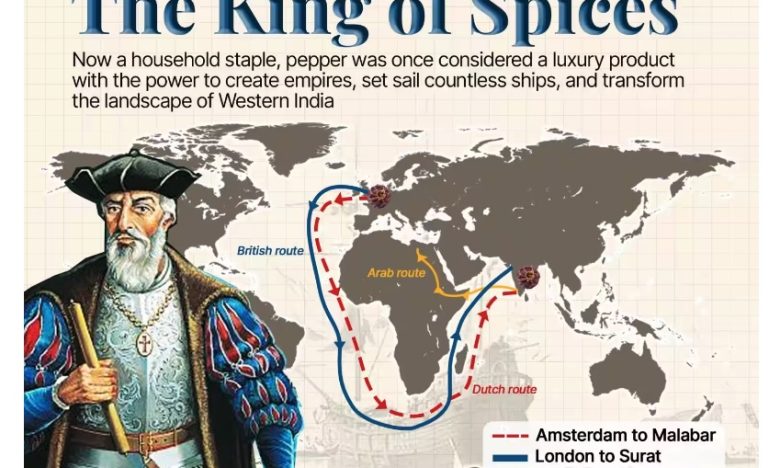MUMBAI, INDIA, August 4, 2023 (Indian Express): Pepper, considered the King of Spices, has been traded around the world since antiquity, prized for its flavor, scarcity and supernatural origins. At one point, the spice became so coveted that it facilitated the Age of Discovery, as European colonial powers battled each other for dominance over the commodity. The history of the world is inextricably linked to the history of trade, in particular, the widespread trade of goods obtained on the back of atrocities and those capable of shaping our entire monetary system. In Tracking the Trade Winds, we look at the seismic importance of gold, sugar, silk, oil and more in connecting civilizations, enriching empires and facilitating the migration of people and resources. Spawning dynasties, triggering conquests and fueling discoveries, pepper has played an important role in shaping the world as we see it. Once accounting for over 80 per cent of the global spice trade volume, the king of spices was likely the primary reason behind the colonization of the East.
Although pepper has been widely consumed for most of recorded history, it was seen as a luxury good. Produced almost exclusively along the Malabar Coast in the southwest of India, the spice was shrouded in secrecy and legend till recent times. According to the historian Paul Friedman, European Christians believed that pepper came from the land of Prester John, a mythical monarch whose subjects existed in an earthly paradise surrounded by forests of pepper. Arabs, who dominated the trade of pepper for several centuries, believed it grew behind waterfalls guarded by fire-breathing dragons. Some Islamic scholars even wrote that the spice was formed by the tears of Adam when he discovered that he had been banished to Earth. There is archaeological evidence to show people were using pepper as early as 2000 BCE in ancient India. The spice is believed to have been exported to other parts of Asia and North Africa. The earliest evidence of pepper being consumed outside of the Indian subcontinent comes from Egypt — the mummified remains of Ramesses the Great from 1213 BCE had peppercorns in the nostrils.
Much more at source.
https://indianexpress.com/article/research/pepper-the-spice-that-brought-the-world-to-india-8875758
A daily summary of world news for Hindus and non-Hindus alike

